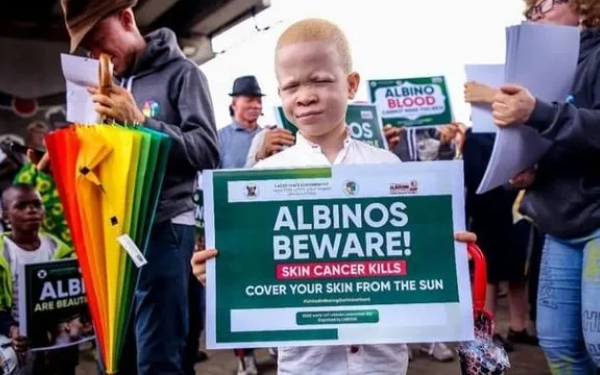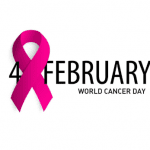The Albino Foundation, a Non-Governmental Organisation, has issued a crucial advisory to individuals living with albinism.
It is highly recommended that they avoid prolonged exposure to the sun to prevent the development of skin cancer.
The foundation has emphasised that people with albinism are particularly susceptible to skin cancer, and the sun has been identified as a significant risk factor in its development.
It is imperative that individuals with albinism take proactive measures to protect their skin from the harmful effects of the sun. This includes wearing protective clothing, using sunscreen with a high SPF, and seeking shade during peak hours of sunlight.
The Albino Foundation remains committed to raising awareness about the unique challenges faced by individuals with albinism and advocating for their rights.
Founder and Chief Executive Officer of the foundation, Jake Epelle, disclosed this in his message in commemoration of the 2023 International Albinism Awareness Day with the theme, ‘Inclusion is Strength.’
International Albinism Awareness Day is celebrated annually on June 13 in recognition of the human rights of persons with albinism worldwide.
According to the United Nations, this year’s theme, “Inclusion is Strength,” builds on last year’s theme of ‘United in making our voice heard’.
The theme emphasises the importance of the inclusion of a diversity of groups from both within and outside the albinism community.
In his message, Epelle noted that the best way an albino can prevent skin cancer is to stay away from the sun.
According to him, “Please stay away from the sun. Don’t expose yourself to the sun. Wear your long sleeve, your hat and ensure to run away from the sun. People would say, well I wear sunscreen. But sunscreen can’t help you that much. In just 10 minutes, the effects will go away and if you don’t reapply, you become vulnerable. Also, the government needs to be involved by equipping the hospitals to manage people with skin cancer. The state government should create a vote for people with albinism.”
The UN says albinism is a genetic condition inherited from both parents and that it occurs worldwide, regardless of ethnicity or gender.
Individuals with albinism are particularly vulnerable to skin cancer and severe visual impairment due to the common lack of melanin pigment in their hair, skin, and eyes. Shockingly, as many as 1 in 5,000 people in Sub-Saharan Africa and 1 in 20,000 people in Europe and North America have albinism. Unfortunately, in some countries, individuals with albinism face discrimination, poverty, stigma, violence, and even murder.
In light of these challenges, it is imperative that the Federal government takes action to support individuals with albinism.
“Specifically, there is a pressing need to resuscitate the free cancer treatment program for persons with albinism. Currently, albinos suffering from skin cancer are unable to access the necessary treatment, which is unacceptable”, according to Mr Epelle.
The Albino Foundation, a Non-Governmental Organisation, has issued a crucial advisory to individuals living with albinism.
It is highly recommended that they avoid prolonged exposure to the sun to prevent the development of skin cancer.
The foundation has emphasised that people with albinism are particularly susceptible to skin cancer, and the sun has been identified as a significant risk factor in its development.
It is imperative that individuals with albinism take proactive measures to protect their skin from the harmful effects of the sun. This includes wearing protective clothing, using sunscreen with a high SPF, and seeking shade during peak hours of sunlight.
The Albino Foundation remains committed to raising awareness about the unique challenges faced by individuals with albinism and advocating for their rights.
Founder and Chief Executive Officer of the foundation, Jake Epelle, disclosed this in his message in commemoration of the 2023 International Albinism Awareness Day with the theme, ‘Inclusion is Strength.’
International Albinism Awareness Day is celebrated annually on June 13 in recognition of the human rights of persons with albinism worldwide.
According to the United Nations, this year’s theme, “Inclusion is Strength,” builds on last year’s theme of ‘United in making our voice heard’.
The theme emphasises the importance of the inclusion of a diversity of groups from both within and outside the albinism community.
In his message, Epelle noted that the best way an albino can prevent skin cancer is to stay away from the sun.
According to him, “Please stay away from the sun. Don’t expose yourself to the sun. Wear your long sleeve, your hat and ensure to run away from the sun. People would say, well I wear sunscreen. But sunscreen can’t help you that much. In just 10 minutes, the effects will go away and if you don’t reapply, you become vulnerable. Also, the government needs to be involved by equipping the hospitals to manage people with skin cancer. The state government should create a vote for people with albinism.”
The UN says albinism is a genetic condition inherited from both parents and that it occurs worldwide, regardless of ethnicity or gender.
Individuals with albinism are particularly vulnerable to skin cancer and severe visual impairment due to the common lack of melanin pigment in their hair, skin, and eyes. Shockingly, as many as 1 in 5,000 people in Sub-Saharan Africa and 1 in 20,000 people in Europe and North America have albinism. Unfortunately, in some countries, individuals with albinism face discrimination, poverty, stigma, violence, and even murder.
In light of these challenges, it is imperative that the Federal government takes action to support individuals with albinism.
“Specifically, there is a pressing need to resuscitate the free cancer treatment program for persons with albinism. Currently, albinos suffering from skin cancer are unable to access the necessary treatment, which is unacceptable”, according to Mr Epelle.
The Albino Foundation, a Non-Governmental Organisation, has issued a crucial advisory to individuals living with albinism.
It is highly recommended that they avoid prolonged exposure to the sun to prevent the development of skin cancer.
The foundation has emphasised that people with albinism are particularly susceptible to skin cancer, and the sun has been identified as a significant risk factor in its development.
It is imperative that individuals with albinism take proactive measures to protect their skin from the harmful effects of the sun. This includes wearing protective clothing, using sunscreen with a high SPF, and seeking shade during peak hours of sunlight.
The Albino Foundation remains committed to raising awareness about the unique challenges faced by individuals with albinism and advocating for their rights.
Founder and Chief Executive Officer of the foundation, Jake Epelle, disclosed this in his message in commemoration of the 2023 International Albinism Awareness Day with the theme, ‘Inclusion is Strength.’
International Albinism Awareness Day is celebrated annually on June 13 in recognition of the human rights of persons with albinism worldwide.
According to the United Nations, this year’s theme, “Inclusion is Strength,” builds on last year’s theme of ‘United in making our voice heard’.
The theme emphasises the importance of the inclusion of a diversity of groups from both within and outside the albinism community.
In his message, Epelle noted that the best way an albino can prevent skin cancer is to stay away from the sun.
According to him, “Please stay away from the sun. Don’t expose yourself to the sun. Wear your long sleeve, your hat and ensure to run away from the sun. People would say, well I wear sunscreen. But sunscreen can’t help you that much. In just 10 minutes, the effects will go away and if you don’t reapply, you become vulnerable. Also, the government needs to be involved by equipping the hospitals to manage people with skin cancer. The state government should create a vote for people with albinism.”
The UN says albinism is a genetic condition inherited from both parents and that it occurs worldwide, regardless of ethnicity or gender.
Individuals with albinism are particularly vulnerable to skin cancer and severe visual impairment due to the common lack of melanin pigment in their hair, skin, and eyes. Shockingly, as many as 1 in 5,000 people in Sub-Saharan Africa and 1 in 20,000 people in Europe and North America have albinism. Unfortunately, in some countries, individuals with albinism face discrimination, poverty, stigma, violence, and even murder.
In light of these challenges, it is imperative that the Federal government takes action to support individuals with albinism.
“Specifically, there is a pressing need to resuscitate the free cancer treatment program for persons with albinism. Currently, albinos suffering from skin cancer are unable to access the necessary treatment, which is unacceptable”, according to Mr Epelle.
The Albino Foundation, a Non-Governmental Organisation, has issued a crucial advisory to individuals living with albinism.
It is highly recommended that they avoid prolonged exposure to the sun to prevent the development of skin cancer.
The foundation has emphasised that people with albinism are particularly susceptible to skin cancer, and the sun has been identified as a significant risk factor in its development.
It is imperative that individuals with albinism take proactive measures to protect their skin from the harmful effects of the sun. This includes wearing protective clothing, using sunscreen with a high SPF, and seeking shade during peak hours of sunlight.
The Albino Foundation remains committed to raising awareness about the unique challenges faced by individuals with albinism and advocating for their rights.
Founder and Chief Executive Officer of the foundation, Jake Epelle, disclosed this in his message in commemoration of the 2023 International Albinism Awareness Day with the theme, ‘Inclusion is Strength.’
International Albinism Awareness Day is celebrated annually on June 13 in recognition of the human rights of persons with albinism worldwide.
According to the United Nations, this year’s theme, “Inclusion is Strength,” builds on last year’s theme of ‘United in making our voice heard’.
The theme emphasises the importance of the inclusion of a diversity of groups from both within and outside the albinism community.
In his message, Epelle noted that the best way an albino can prevent skin cancer is to stay away from the sun.
According to him, “Please stay away from the sun. Don’t expose yourself to the sun. Wear your long sleeve, your hat and ensure to run away from the sun. People would say, well I wear sunscreen. But sunscreen can’t help you that much. In just 10 minutes, the effects will go away and if you don’t reapply, you become vulnerable. Also, the government needs to be involved by equipping the hospitals to manage people with skin cancer. The state government should create a vote for people with albinism.”
The UN says albinism is a genetic condition inherited from both parents and that it occurs worldwide, regardless of ethnicity or gender.
Individuals with albinism are particularly vulnerable to skin cancer and severe visual impairment due to the common lack of melanin pigment in their hair, skin, and eyes. Shockingly, as many as 1 in 5,000 people in Sub-Saharan Africa and 1 in 20,000 people in Europe and North America have albinism. Unfortunately, in some countries, individuals with albinism face discrimination, poverty, stigma, violence, and even murder.
In light of these challenges, it is imperative that the Federal government takes action to support individuals with albinism.
“Specifically, there is a pressing need to resuscitate the free cancer treatment program for persons with albinism. Currently, albinos suffering from skin cancer are unable to access the necessary treatment, which is unacceptable”, according to Mr Epelle.
The Albino Foundation, a Non-Governmental Organisation, has issued a crucial advisory to individuals living with albinism.
It is highly recommended that they avoid prolonged exposure to the sun to prevent the development of skin cancer.
The foundation has emphasised that people with albinism are particularly susceptible to skin cancer, and the sun has been identified as a significant risk factor in its development.
It is imperative that individuals with albinism take proactive measures to protect their skin from the harmful effects of the sun. This includes wearing protective clothing, using sunscreen with a high SPF, and seeking shade during peak hours of sunlight.
The Albino Foundation remains committed to raising awareness about the unique challenges faced by individuals with albinism and advocating for their rights.
Founder and Chief Executive Officer of the foundation, Jake Epelle, disclosed this in his message in commemoration of the 2023 International Albinism Awareness Day with the theme, ‘Inclusion is Strength.’
International Albinism Awareness Day is celebrated annually on June 13 in recognition of the human rights of persons with albinism worldwide.
According to the United Nations, this year’s theme, “Inclusion is Strength,” builds on last year’s theme of ‘United in making our voice heard’.
The theme emphasises the importance of the inclusion of a diversity of groups from both within and outside the albinism community.
In his message, Epelle noted that the best way an albino can prevent skin cancer is to stay away from the sun.
According to him, “Please stay away from the sun. Don’t expose yourself to the sun. Wear your long sleeve, your hat and ensure to run away from the sun. People would say, well I wear sunscreen. But sunscreen can’t help you that much. In just 10 minutes, the effects will go away and if you don’t reapply, you become vulnerable. Also, the government needs to be involved by equipping the hospitals to manage people with skin cancer. The state government should create a vote for people with albinism.”
The UN says albinism is a genetic condition inherited from both parents and that it occurs worldwide, regardless of ethnicity or gender.
Individuals with albinism are particularly vulnerable to skin cancer and severe visual impairment due to the common lack of melanin pigment in their hair, skin, and eyes. Shockingly, as many as 1 in 5,000 people in Sub-Saharan Africa and 1 in 20,000 people in Europe and North America have albinism. Unfortunately, in some countries, individuals with albinism face discrimination, poverty, stigma, violence, and even murder.
In light of these challenges, it is imperative that the Federal government takes action to support individuals with albinism.
“Specifically, there is a pressing need to resuscitate the free cancer treatment program for persons with albinism. Currently, albinos suffering from skin cancer are unable to access the necessary treatment, which is unacceptable”, according to Mr Epelle.
The Albino Foundation, a Non-Governmental Organisation, has issued a crucial advisory to individuals living with albinism.
It is highly recommended that they avoid prolonged exposure to the sun to prevent the development of skin cancer.
The foundation has emphasised that people with albinism are particularly susceptible to skin cancer, and the sun has been identified as a significant risk factor in its development.
It is imperative that individuals with albinism take proactive measures to protect their skin from the harmful effects of the sun. This includes wearing protective clothing, using sunscreen with a high SPF, and seeking shade during peak hours of sunlight.
The Albino Foundation remains committed to raising awareness about the unique challenges faced by individuals with albinism and advocating for their rights.
Founder and Chief Executive Officer of the foundation, Jake Epelle, disclosed this in his message in commemoration of the 2023 International Albinism Awareness Day with the theme, ‘Inclusion is Strength.’
International Albinism Awareness Day is celebrated annually on June 13 in recognition of the human rights of persons with albinism worldwide.
According to the United Nations, this year’s theme, “Inclusion is Strength,” builds on last year’s theme of ‘United in making our voice heard’.
The theme emphasises the importance of the inclusion of a diversity of groups from both within and outside the albinism community.
In his message, Epelle noted that the best way an albino can prevent skin cancer is to stay away from the sun.
According to him, “Please stay away from the sun. Don’t expose yourself to the sun. Wear your long sleeve, your hat and ensure to run away from the sun. People would say, well I wear sunscreen. But sunscreen can’t help you that much. In just 10 minutes, the effects will go away and if you don’t reapply, you become vulnerable. Also, the government needs to be involved by equipping the hospitals to manage people with skin cancer. The state government should create a vote for people with albinism.”
The UN says albinism is a genetic condition inherited from both parents and that it occurs worldwide, regardless of ethnicity or gender.
Individuals with albinism are particularly vulnerable to skin cancer and severe visual impairment due to the common lack of melanin pigment in their hair, skin, and eyes. Shockingly, as many as 1 in 5,000 people in Sub-Saharan Africa and 1 in 20,000 people in Europe and North America have albinism. Unfortunately, in some countries, individuals with albinism face discrimination, poverty, stigma, violence, and even murder.
In light of these challenges, it is imperative that the Federal government takes action to support individuals with albinism.
“Specifically, there is a pressing need to resuscitate the free cancer treatment program for persons with albinism. Currently, albinos suffering from skin cancer are unable to access the necessary treatment, which is unacceptable”, according to Mr Epelle.
The Albino Foundation, a Non-Governmental Organisation, has issued a crucial advisory to individuals living with albinism.
It is highly recommended that they avoid prolonged exposure to the sun to prevent the development of skin cancer.
The foundation has emphasised that people with albinism are particularly susceptible to skin cancer, and the sun has been identified as a significant risk factor in its development.
It is imperative that individuals with albinism take proactive measures to protect their skin from the harmful effects of the sun. This includes wearing protective clothing, using sunscreen with a high SPF, and seeking shade during peak hours of sunlight.
The Albino Foundation remains committed to raising awareness about the unique challenges faced by individuals with albinism and advocating for their rights.
Founder and Chief Executive Officer of the foundation, Jake Epelle, disclosed this in his message in commemoration of the 2023 International Albinism Awareness Day with the theme, ‘Inclusion is Strength.’
International Albinism Awareness Day is celebrated annually on June 13 in recognition of the human rights of persons with albinism worldwide.
According to the United Nations, this year’s theme, “Inclusion is Strength,” builds on last year’s theme of ‘United in making our voice heard’.
The theme emphasises the importance of the inclusion of a diversity of groups from both within and outside the albinism community.
In his message, Epelle noted that the best way an albino can prevent skin cancer is to stay away from the sun.
According to him, “Please stay away from the sun. Don’t expose yourself to the sun. Wear your long sleeve, your hat and ensure to run away from the sun. People would say, well I wear sunscreen. But sunscreen can’t help you that much. In just 10 minutes, the effects will go away and if you don’t reapply, you become vulnerable. Also, the government needs to be involved by equipping the hospitals to manage people with skin cancer. The state government should create a vote for people with albinism.”
The UN says albinism is a genetic condition inherited from both parents and that it occurs worldwide, regardless of ethnicity or gender.
Individuals with albinism are particularly vulnerable to skin cancer and severe visual impairment due to the common lack of melanin pigment in their hair, skin, and eyes. Shockingly, as many as 1 in 5,000 people in Sub-Saharan Africa and 1 in 20,000 people in Europe and North America have albinism. Unfortunately, in some countries, individuals with albinism face discrimination, poverty, stigma, violence, and even murder.
In light of these challenges, it is imperative that the Federal government takes action to support individuals with albinism.
“Specifically, there is a pressing need to resuscitate the free cancer treatment program for persons with albinism. Currently, albinos suffering from skin cancer are unable to access the necessary treatment, which is unacceptable”, according to Mr Epelle.
The Albino Foundation, a Non-Governmental Organisation, has issued a crucial advisory to individuals living with albinism.
It is highly recommended that they avoid prolonged exposure to the sun to prevent the development of skin cancer.
The foundation has emphasised that people with albinism are particularly susceptible to skin cancer, and the sun has been identified as a significant risk factor in its development.
It is imperative that individuals with albinism take proactive measures to protect their skin from the harmful effects of the sun. This includes wearing protective clothing, using sunscreen with a high SPF, and seeking shade during peak hours of sunlight.
The Albino Foundation remains committed to raising awareness about the unique challenges faced by individuals with albinism and advocating for their rights.
Founder and Chief Executive Officer of the foundation, Jake Epelle, disclosed this in his message in commemoration of the 2023 International Albinism Awareness Day with the theme, ‘Inclusion is Strength.’
International Albinism Awareness Day is celebrated annually on June 13 in recognition of the human rights of persons with albinism worldwide.
According to the United Nations, this year’s theme, “Inclusion is Strength,” builds on last year’s theme of ‘United in making our voice heard’.
The theme emphasises the importance of the inclusion of a diversity of groups from both within and outside the albinism community.
In his message, Epelle noted that the best way an albino can prevent skin cancer is to stay away from the sun.
According to him, “Please stay away from the sun. Don’t expose yourself to the sun. Wear your long sleeve, your hat and ensure to run away from the sun. People would say, well I wear sunscreen. But sunscreen can’t help you that much. In just 10 minutes, the effects will go away and if you don’t reapply, you become vulnerable. Also, the government needs to be involved by equipping the hospitals to manage people with skin cancer. The state government should create a vote for people with albinism.”
The UN says albinism is a genetic condition inherited from both parents and that it occurs worldwide, regardless of ethnicity or gender.
Individuals with albinism are particularly vulnerable to skin cancer and severe visual impairment due to the common lack of melanin pigment in their hair, skin, and eyes. Shockingly, as many as 1 in 5,000 people in Sub-Saharan Africa and 1 in 20,000 people in Europe and North America have albinism. Unfortunately, in some countries, individuals with albinism face discrimination, poverty, stigma, violence, and even murder.
In light of these challenges, it is imperative that the Federal government takes action to support individuals with albinism.
“Specifically, there is a pressing need to resuscitate the free cancer treatment program for persons with albinism. Currently, albinos suffering from skin cancer are unable to access the necessary treatment, which is unacceptable”, according to Mr Epelle.














